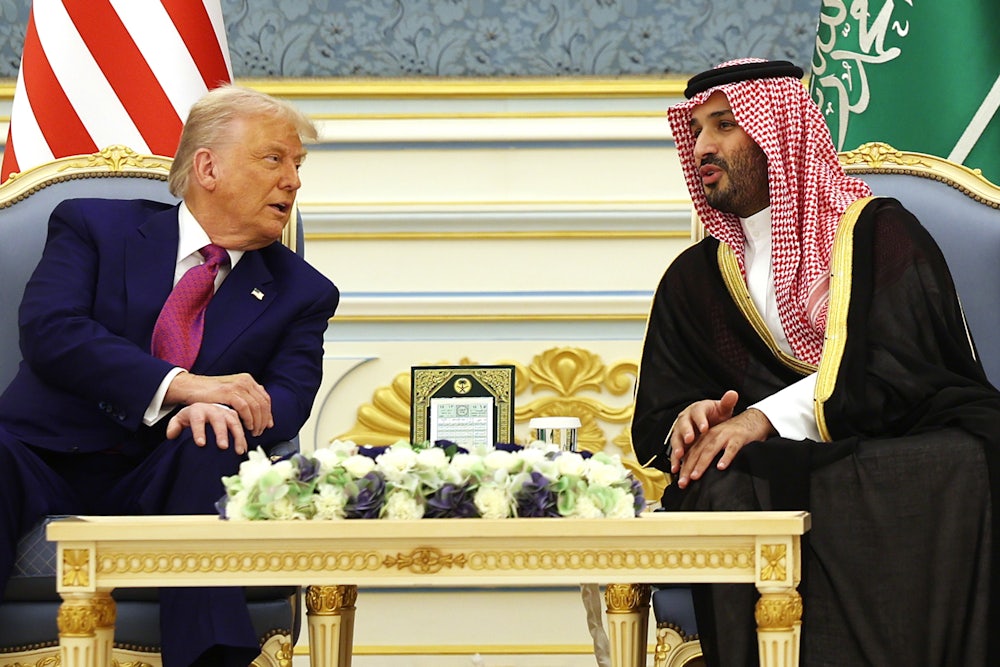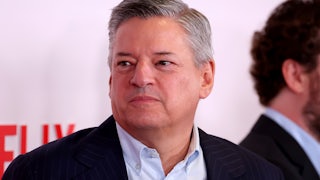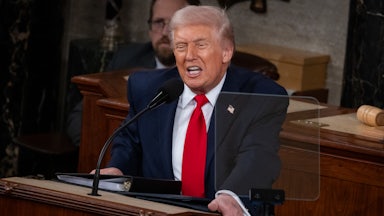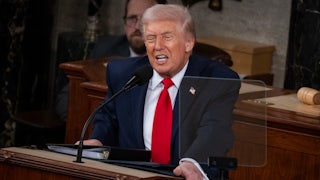As President Donald Trump visits the Middle East on his first major foreign trip of his second term, there is one country he isn’t scheduled to visit that might come as a surprise: Israel. With planned presidential stops in Saudi Arabia, the UAE, Qatar, and possibly Turkey, it seems that Israel, one of the few places in the world where Trump is seen favorably, is not on the schedule. The reason? Trump has figured out that Israel’s prime minister, Benjamin Netanyahu, is a key obstacle to his foreign policy agenda in the region.
Aside from Trump’s somewhat impromptu visit to the Vatican for the funeral of Pope Francis, this is his first trip abroad, and it has been planned for months. From Trump’s perspective, the Middle East is high on his foreign affairs agenda for several reasons. Aside from the usual U.S. interests at play there, he sees the Middle East as the place where he had the most historic success in foreign affairs in his first term, with the so-called Abraham Accords, which brought forth normalization agreements between Israel and several Arab states.
That too was the result of prioritizing the Middle East with a high-level trip in the early months of his first term, which set the stage for the agreements that were signed in the years that followed. Now, there is no shortage of problems with the Abraham Accords, as these are essentially arms deals between nondemocratic regimes, instead of true peace agreements between nations. But as far as Trump is concerned, reaching these deals and expanding them puts him on the Mount Rushmore of American peacemakers.
That isn’t likely to happen this time around. And the key reason is Benjamin Netanyahu. The indicted war criminal and Israeli prime minister, who had long touted the idea of normalizing ties with Arab gulf states, is too focused on prioritizing his political survival to be able to support Trump’s regional agenda. Henry Kissinger once asserted that Israel has no foreign policy, just domestic politics. Netanyahu has never seemed more hell-bent on proving him right.
Trump would prefer that this Middle East trip, like his first one in 2017, could set the stage for an expansion of the accords in the years to come, but Netanyahu’s unwillingness to end the genocidal campaign in Gaza is making that impossible. Instead, Trump is having to make this Middle East trip about second-tier objectives that are primarily economic in nature. That isn’t terrible for Trump, but it also isn’t what he wanted it to be.
The ceasefire agreement that was put into place around Trump’s inauguration was supposed to open up new possibilities for this trip. Had the ceasefire stayed in effect, we would be into the third phase now, which would have meant an end to the war and a complete exchange of captives. Such conditions could have enabled a different set of conversations with Arab interlocutors. But it was not to be; Netanyahu blew up the ceasefire agreement after the first phase in mid-March. It was likely around this time that Trump concluded that Netanyahu was not a partner he could rely on because the Israeli prime minister was more interested in the approval of his far-right coalition members who want to ethnically cleanse and colonize the Gaza Strip than he was in President Trump. Consequently, Trump’s behavior in the region similarly took a far more self-interested path.
On multiple fronts over the last two months, Trump has proceeded to make decisions in the region that circumvented the Israelis. In early April, Trump summoned Netanyahu to the White House while he was on a trip to Europe. Netanyahu’s plane had to avoid several European states’ airspace on the flight over as he could have been arrested for war crimes charges. What was an uncomfortable trip for Netanyahu only became more awkward when Trump announced, with Netanyahu seated next to him, that the United States would begin direct negotiations with Iran to resolve differences over its nuclear program. Netanyahu, who has spent much of the last two decades trying to get the U.S. into direct confrontation with Iran, now found himself seated next to the very American president he had hoped would fulfill his dream, who instead surprised him with direct U.S.-Iran negotiations.
Concurrently, Trump began a shake-up of the National Security Council, dismissing several officials thought to be hawkish on Iran. By May, he had also sacked his national security adviser, Michael Waltz. Haaretz analyst Chaim Levinson explains that in Waltz, Netanyahu and his associate Ron Dermer believed they had their man in the White House, “through whom they could maneuver their way into the Oval Office and shape its Middle East strategy.”
This was just on one front. Elsewhere, President Trump had authorized his envoy Adam Boehler to directly engage with Hamas to secure the release of an American Israeli soldier held captive in Gaza. The Israelis, who learned about this indirectly, blew up the deal. On the one hand, the Israelis objected to the U.S. working separately from the Israelis to get an American citizen out of Gaza, but in addition, the very idea of U.S.-Hamas talks broke a taboo that the Israelis hoped would always stay in place. It also made clear that progress on an exchange deal was possible with Hamas but that it was the Israelis, and Netanyahu in particular, that were the holdup.
A month later, Boehler’s engagement with Hamas bore fruit, and without Israel’s involvement, a deal was struck to have the American Israeli captive released in time for Trump’s trip to the region. Reports indicated that the released soldier, Idan Alexander, refused to meet with Netanyahu after being released and instead will travel to Doha, Qatar, alongside Boehler and Steve Witkoff, another presidential envoy to the region, to meet with Trump when he is there to meet with Qatar’s Emir.
Yemen is another place where clear divisions between U.S. and Israeli interests are apparent. Last week, President Trump announced, again to the surprise of many, and again without Israel’s knowledge, that the U.S. had struck a separate ceasefire agreement with the Houthis in Yemen, brokered by Witkoff through Omani mediation. The Houthis agreed not to strike U.S. ships, and the U.S. agreed to stop striking Yemen. This came only two days after a Houthi-fired missile landed next to Israel’s main airport, shutting down several air traffic routes. Trump decided that the Yemen campaign made little sense—that the U.S. was spending way too much money and wasting military assets for a campaign that wasn’t in America’s interest, even if it may have been in Israel’s.
Finally—yes, there’s one more!—Syria too is emerging as another fault line in U.S. and Israeli interests. After years of civil war and internal collapse, longtime Syrian dictator Bashar Al Assad was finally ousted last December, and a new government in Syria was formed by a Turkish-backed Syrian faction that was proscribed as a terror organization by the U.S. Israel would like to see Syria remain a weak and divided state, even if that means further breaking it up along sectarian lines or fomenting another decade of civil war. But the rest of the region, and Syrians themselves, do not want this outcome. Instead, they want a stable, peaceful, prosperous Syria that reintegrates into the global and regional economy.
A key obstacle in their path is Western sanctions on Syria that have crippled its economy and made foreign investment impossible. Current Syrian President Ahmed Al Sharaa, also known as Abu Mohammed Al Jolani, recently visited France for the first time to press his case at the Élysée Palace. Sharaa, who is still a U.S.-designated terrorist, is supposed to be meeting with President Trump in Riyadh. But Trump made the big headline before the meeting even took place, announcing in an address that after speaking with the Saudi crown prince and the Turkish president, he has decided to lift all sanctions on Syria. Syria’s neighbors, such as Turkey, Jordan, and Lebanon, have also borne the burdens of Syria’s long war, dealing with refugee influxes that have presented severe economic and political challenges, and they too want to see a Syria that can be a safe and prosperous neighbor.
Israel has a different agenda. Trump, the businessman turned president, seems to have decided that a Syria open for global investment and growth is better than one constantly subject to Israeli domination. Netanyahu isn’t going to be thrilled with this decision either. Nor will Netanyahu, who has long championed the use of American power to reshape the Middle East, be happy to hear Trump lambaste neoconservatives, nation-builders, and interventionists.
We should have no illusions that Trump’s growing list of differences with Netanyahu is the product of a newfound love for Palestinians or the people of the region. Palestinians remain the weakest players in the region, with the least to offer the most transactional president in American history. Trump is merely acting out of a love for himself and the achievements he can rack up in a region that has long been central to American interests and the cause of many presidential headaches.
Everywhere he looks across the region, he sees opportunities for progress and deals that can be made in America’s interests—and might even someday bring him that Nobel Peace Prize he covets. And every one of them is being complicated by Benjamin Netanyahu. It is an ironic twist of history, given how much Netanyahu favored Trump over Democratic alternatives seeking the White House, and it is not clear how long the divisions will remain. But at this moment, while the Middle East is front and center in the president’s agenda, Netanyahu’s role as a central obstacle in it could not be clearer.






